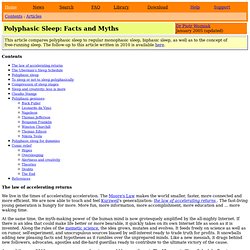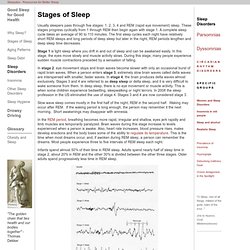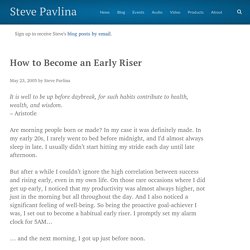

Polyphasic Sleep: Facts and Myths. Contents The law of accelerating returns We live in the times of accelerating acceleration.

The Moore's Law makes the world smaller, faster, more connected and more efficient. We are now able to touch and feel Kurzweil's generalization: the law of accelerating returns . The fast-living young generation is hungry for more. At the same time, the myth-making power of the human mind is now grotesquely amplified by the all-mighty Internet. Around the year 2000, a new meme cropped up in several blogs on the net: The Uberman's Sleep Schedule.
The Uberman's Sleep Schedule The idea behind the Uberman's Sleep Schedule is to gain waking hours by sleeping the total of just 3 hours in 6 portions distributed equally throughout the day. Polyphasic sleep. Findings Suggest That A Biphasic Sleep Schedule Not Only Refresh. Understanding Sleep: Deep Sleep, REM Sleep, Cycles, Stages, and. The power of sleep Many of us try to sleep as little as possible.

There are so many things that seem more interesting or important than getting a few more hours of sleep, but just as exercise and nutrition are essential for optimal health and happiness, so is sleep. The quality of your sleep directly affects the quality of your waking life, including your mental sharpness, productivity, emotional balance, creativity, physical vitality, and even your weight. No other activity delivers so many benefits with so little effort! Understanding sleep Sleep isn’t exactly a time when your body and brain shut off. The good news is that you don't have to choose between health and productivity. Stages of Sleep. Usually sleepers pass through five stages: 1, 2, 3, 4 and REM (rapid eye movement) sleep.

These stages progress cyclically from 1 through REM then begin again with stage 1. Polyphasic Sleep. A couple days ago, I saw a post about polyphasic sleep on LifeHack.org. Since then I’ve been emailed about this topic as well, probably because I’ve written previously about becoming an early riser. How to Become an Early Riser.
It is well to be up before daybreak, for such habits contribute to health, wealth, and wisdom. – Aristotle Are morning people born or made?

In my case it was definitely made. In my early 20s, I rarely went to bed before midnight, and I’d almost always sleep in late. I usually didn’t start hitting my stride each day until late afternoon. But after a while I couldn’t ignore the high correlation between success and rising early, even in my own life. . … and the next morning, I got up just before noon. Hmmm… I tried again many more times, each time not getting very far with it. It’s hard to become an early riser using the wrong strategy. The most common wrong strategy is this: You assume that if you’re going to get up earlier, you’d better go to bed earlier. Ultradian Rhythms & the 20-minute Break. Switching to Biphasic Sleeping? Start here.
Effects of biphasic sleep on alertness and performance. In short photoperiods, human sleep is biphasic. THOMAS A. WEHR. The Power of the Sleep Cycle « Glen Rhodes. Ok, I’ve been talking to people for a long time about the fact that you can get by on 6 or even 4.5 hours of sleep per day without question.

The secret is NOT the amount of sleep, but rather the number itself; a multiple of 90 minutes will change your life. One thing I should mention, is that because we are analog beings, and not computers, that which could be 90 minutes for some people, might be 80 minutes for another, or 100 minutes for another; you will eventually learn the length of your sleep cycle by watching the times you naturally wake up and turn over, make a mental note of the time / interval. But assuming that 90 minutes is the average, these are the best lengths of sleep that will not make you feel groggy.
The worst thing to do is wake up in the middle of a sleep cycle. Easy way to reset your sleep cycle: Stop eating. Not eating for 12-16 hours can help people quickly reset their sleep-wake cycle, according to a new study from the Harvard Medical School.

This discovery can drastically improve a person's ability to cope with jet lag or adjust to working late shifts. Scientists have long known that our circadian rhythm is regulated by our exposure to light. Now they have found a second "food clock" that takes over when we are hungry. This mechanism probably evolved to make sure starving mammals don't go to sleep when they should be foraging for food. The lead researcher Clifford Saper explains: The neat thing about this second clock is that it can override the main clock ... and you should just flip into that new time zone in one day.
It usually takes people a week to fully adjust to a new time zone or sleeping schedule. How does it work? Simply stop eating during the 12-16 hour period before you want to be awake. Why does this work? "For a small mammal, finding food on a daily basis is a critical mission.